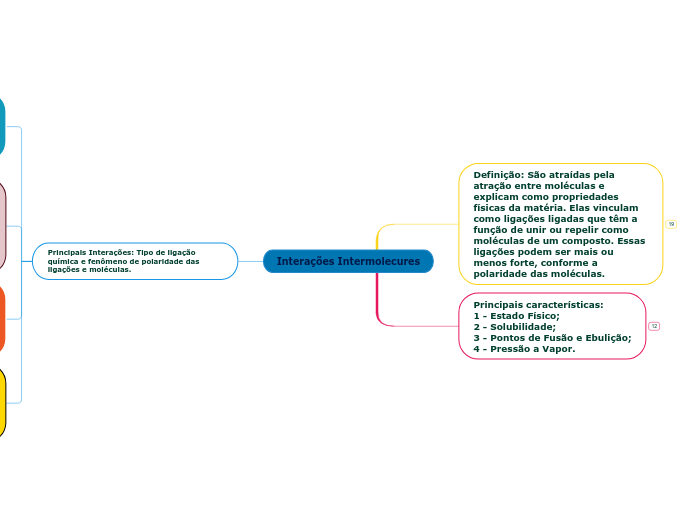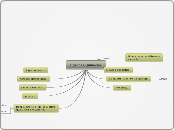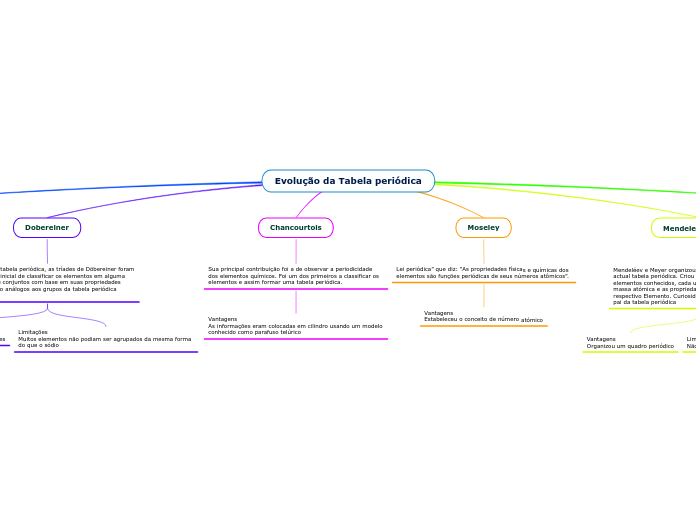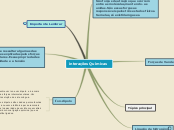Interações Intermolecures
Type in the name of the company you are going to have an interview with.
Principais Interações: Tipo de ligação química e fenômeno de polaridade das ligações e moléculas.
ÍON-DIPOLO:
1 - De todas, é uma interação mais forte, pois existe uma grande diferença de eletronegatividade;
2 - Ocorre entre um íon e uma substância polar;
3 - É maior à medida em que:
a) A carga do íon aumenta (Al ^ 3 +> Mg ^ 2> Na ^ 2 +
b) O raio iônico interno (Sr ^ 2 +> Ca ^ 2 +> Mg ^ 2 +)
c) O momento de dipolo aumenta (HF> HCl> HBr> HI)
Solubilidade de Sais:
Interação entre polos de H2O e íons de sal cloreto de potássio.
LIGAÇÃO DE HIDROGÊNIO:
1 - Conhecida como ponte de hidrogênio;
2 - Também em moléculas polares, mas apenas nos átomos de oxigênio, nitrogênio ou flúor ligado a hidrogênio;
3- Átomos mais eletronegativos da tabela periódica;
4 - Interação mais forte;
What experience have you got from your previous jobs? Make sure you specify all your previous work experience, part-time jobs, vacation jobs, voluntary work, and unpaid work experience that are relevant for the position you are applying for.
EXEMPLOS:
Alguns exemplos de moléculas que interagem por ligações de hidrogênio são: ácido fluorídrico (HF), amônia (NH3) e água (H2O).
DIPOLO-DIPOLO:
1 - Moléculas polares;
2- Interação intermolecular mais forte (permanente e constante);
3 - Ocorre quando o polo positivo de uma molécula está próximo do polo negativo de outra molécula;
4 - Quanto mais polares, maior será a força de interação (aumento de temperatura e mudanças de estados);
Describe a typical work day in your previous/current position.
Typical day
DIPOLO- INDUZIDO:
1 - Interação mais fraca;
2 - Força de Van der Waals;
3 - Moléculas apolares ou partes apolares;
4 - A intensidade quando aumenta-se ao tamanho da molécula;
5 - Ocorre após as moléculas se colidirem;
Why will/did you leave your existing/last job?
EXEMPLO:
A molécula I2 é sólido pelo seu volume alto e possui as seguintes características:
Massa (m): 254
Ponto de Fusão (° C): 114
Ponto de ebulição (° C): 184
Subtópico
Principais características:
1 - Estado Físico;
2 - Solubilidade;
3 - Pontos de Fusão e Ebulição;
4 - Pressão a Vapor.
Are you qualified for this position?
Interviewers will want to know whether or not you are able to do the job.
Answer the questions from this section and see if you are the right person for this position.
Hire me because:
What is the most compelling reason you should be hired?
Compelling hiring reason
Differentiating aptitudes
What can you do for this job that other candidates can't? Why?
Differentiating aptitude
Observed by my colleagues/superiors
Which qualities were easily observed by your colleagues and/or your former/existing boss?
Type them in.
Observed qualities
Weaknesses
What are your weaknesses?
Examples:
stubbornoverly critical, can't accept authoritytoo demandingtoo talkativetoo quiettoo sensitivelacking assertivenesslacking social tact
Weakness
How do you work on overcoming these weaknesses?
Type in a short explanation.
Strengths
What strengths qualify you for this job?
Example:
ambitiousgood communicatorfocuseddeterminedadaptablecuriousoptimisthard workerhonestpoliteco-operativeself motivatedenthusiasticgood leaderstrategic thinkerquick learnerflexiblegood problem solver
Strength
Explanation
Why do you think you have this strength?
Give an example.
Definição: São atraídas pela atração entre moléculas e explicam como propriedades físicas da matéria. Elas vinculam como ligações ligadas que têm a função de unir ou repelir como moléculas de um composto. Essas ligações podem ser mais ou menos forte, conforme a polaridade das moléculas.
Research the company
You should find and learn as much as you can about the company where you are having an interview.
The interviewer will want to see what you know about them and why you chose the company.
Doing your homework will show that you are really interested.
Main goal and vision
What do you know about the company's main goal and vision?
Type in the answer.
Vision/goal
Facts
History
What do you know about the history of the company?
Type in a short description.
Company history
Innovations
What kind of innovations does this company have?
Type in several examples.
Innovation
Last year turnover
What is the company's turnover for last year?
Turnover
Products
What products does this company have?
Type in several examples.
Product
Size
What is the size of this company?
Company size
Added Value
What can you do for this company that someone else can't?
Type in several unique traits that will turn you into the perfect candidate for the position.
Unique skill
Knowledge
What do you know about the company?
Type a short description of the company's background.
Background
Motivation
Why do you want to work for this company?
Think of what you can do for them, not of what they can do for you.
Reason to work









